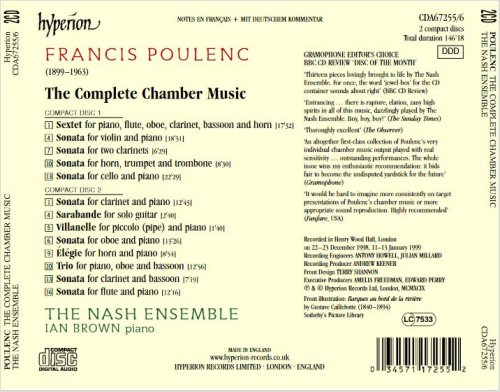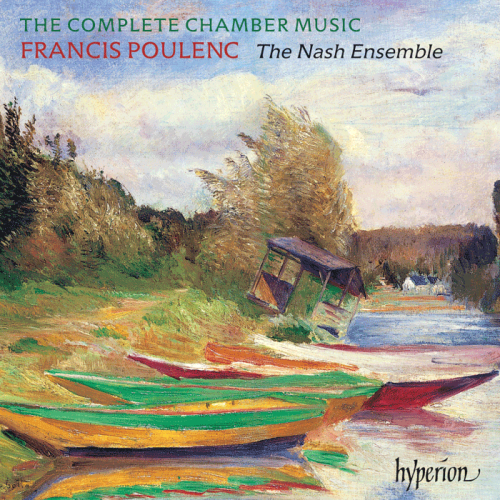
The Nash Ensemble, Ian Brown - Francis Poulenc: The Complete Chamber Music (1999) CD-Rip
BAND/ARTIST: The Nash Ensemble, Ian Brown
- Title: Francis Poulenc: The Complete Chamber Music
- Year Of Release: 1999
- Label: Hyperion
- Genre: Classical
- Quality: FLAC (tracks+.cue,log,scans)
- Total Time: 02:26:15
- Total Size: 467 Mb
- WebSite: Album Preview
Tracklist:
CD 1:
Sextet for piano, flute, oboe, clarinet, bassoon and horn:
01. I. Allegro vivace. (7:46)
02. II. Divertissement. Andantino (4:26)
03. III. Finale. Prestissimo (5:38)
Sonata for violin and piano:
04. I. Allegro con fuoco (6:37)
05. II. Intermezzo (6:44)
06. III. Presto tragico - Strictement la double plus lent (5:30)
Sonata for two clarinets:
07. I. Presto (1:58)
08. II. Andante. Tres lent (2:53)
09. III. Vif. Vite avec joie (1:53)
Sonata for horn, trumpet and trombone:
10. I. Allegro moderato. Grazioso (3:47)
11. II. Andante. Tres lent (2:22)
12. III. Rondeau. Anime (1:32)
Sonata for cello and piano:
13. I. Allegro. Tempo di Marcia (6:01)
14. II. Cavatine. Tres calme (6:41)
15. III. Ballabile. Tres anime et gai (3:29)
16. IV. Finale. Largo, tres librement - Presto subito - Largo (6:30)
CD 2:
Sonata for clarinet and piano:
01. I. Allegro tristamente - Tres calme (4:54)
02. II. Romanza. Tres calme (4:53)
03. III. Allegro con fuoco - Tres anime (3:11)
Sarabande for solo guitar:
04. Molto calmo e melanconico (2:46)
Villanelle for piccolo 'pipe' and piano:
05. Modere (1:48)
Sonata for oboe and piano:
06. I. Elegie. Paisiblement (5:18)
07. II. Scherzo. Tres anime (3:56)
08. III. Deploration. Tres calme (4:30)
Élégie for horn and piano:
09. (In memory of Dennis Brain) (9:02)
Trio for piano, oboe and bassoon:
10. I. Lent - Presto (5:12)
11. II. Andante con moto (3:46)
12. III. Rondo. Tres vif (3:16)
Sonata for clarinet and bassoon:
13. I. Allegro. Tres rythme (1:44)
14. II. Romance. Andante tres doux (2:56)
15. III. Finale. Tres anime - Andante (2:55)
Sonata for flute and piano:
16. I. Allegretto malincolico (4:18)
17. II. Cantilena. Assez lent (4:29)
18. III. Presto gioso (3:34)
Performers:
The Nash Ensemble
Ian Brown, piano

CD 1:
Sextet for piano, flute, oboe, clarinet, bassoon and horn:
01. I. Allegro vivace. (7:46)
02. II. Divertissement. Andantino (4:26)
03. III. Finale. Prestissimo (5:38)
Sonata for violin and piano:
04. I. Allegro con fuoco (6:37)
05. II. Intermezzo (6:44)
06. III. Presto tragico - Strictement la double plus lent (5:30)
Sonata for two clarinets:
07. I. Presto (1:58)
08. II. Andante. Tres lent (2:53)
09. III. Vif. Vite avec joie (1:53)
Sonata for horn, trumpet and trombone:
10. I. Allegro moderato. Grazioso (3:47)
11. II. Andante. Tres lent (2:22)
12. III. Rondeau. Anime (1:32)
Sonata for cello and piano:
13. I. Allegro. Tempo di Marcia (6:01)
14. II. Cavatine. Tres calme (6:41)
15. III. Ballabile. Tres anime et gai (3:29)
16. IV. Finale. Largo, tres librement - Presto subito - Largo (6:30)
CD 2:
Sonata for clarinet and piano:
01. I. Allegro tristamente - Tres calme (4:54)
02. II. Romanza. Tres calme (4:53)
03. III. Allegro con fuoco - Tres anime (3:11)
Sarabande for solo guitar:
04. Molto calmo e melanconico (2:46)
Villanelle for piccolo 'pipe' and piano:
05. Modere (1:48)
Sonata for oboe and piano:
06. I. Elegie. Paisiblement (5:18)
07. II. Scherzo. Tres anime (3:56)
08. III. Deploration. Tres calme (4:30)
Élégie for horn and piano:
09. (In memory of Dennis Brain) (9:02)
Trio for piano, oboe and bassoon:
10. I. Lent - Presto (5:12)
11. II. Andante con moto (3:46)
12. III. Rondo. Tres vif (3:16)
Sonata for clarinet and bassoon:
13. I. Allegro. Tres rythme (1:44)
14. II. Romance. Andante tres doux (2:56)
15. III. Finale. Tres anime - Andante (2:55)
Sonata for flute and piano:
16. I. Allegretto malincolico (4:18)
17. II. Cantilena. Assez lent (4:29)
18. III. Presto gioso (3:34)
Performers:
The Nash Ensemble
Ian Brown, piano

Invidious as it may seem to pick out just one of these excellent artists, special mention must be made of Ian Brown, who plays in nine of the 13 works included and confirms his standing as one of the most admired and musicianly chamber pianists of our day. He knows, for example, how to control Poulenc's boisterous piano writing in the Sextet without sacrificing the sparkle, and as a result the work coheres better than ever before. Like the Trio (whose opening reveals Stravinskian influence), it's a mixture of the composer's madcap gamin mood and his predominantly melancholy bittersweet lyricism.
The latter characteristic is most in evidence in his most enduring chamber works: the solo wind sonatas with piano, all three of which were in the nature of tombeaux , the Flute Sonata for the American patron Mrs Sprague Coolidge, that for clarinet for Honegger, and that for oboe for Prokofiev. All are given idiomatic, sensitive and satisfying performances by the Nash artists.
The Elégie for Dennis Brain was a not altogether convincing experiment in dodecaphony: Poulenc had earlier dabbled in atonality and polytonality in the little sonatas (really sonatinas) for, respectively, two clarinets and for clarinet and bassoon. There's a touching reading of the little Sarabande for guitar. A hint of the guitar's tuning at the start of the second move- ment is almost the only Spanish reference in the Violin Sonata, which was composed in memoriam the poet Lorca, whose loss is bitterly suggested in the angry finale. In this work Poulenc allotted to the piano (his own instrument) rather more than equal status in the duo – a situation rather paralleled in the lighthearted Cello Sonata, over which the composer dallied longer than any other of his works – but balance in both is finely judged by the performers and the recording team.
The whole issue wins enthusiastic recommendation: it bids fair to become the undisputed yardstick for the future.
The latter characteristic is most in evidence in his most enduring chamber works: the solo wind sonatas with piano, all three of which were in the nature of tombeaux , the Flute Sonata for the American patron Mrs Sprague Coolidge, that for clarinet for Honegger, and that for oboe for Prokofiev. All are given idiomatic, sensitive and satisfying performances by the Nash artists.
The Elégie for Dennis Brain was a not altogether convincing experiment in dodecaphony: Poulenc had earlier dabbled in atonality and polytonality in the little sonatas (really sonatinas) for, respectively, two clarinets and for clarinet and bassoon. There's a touching reading of the little Sarabande for guitar. A hint of the guitar's tuning at the start of the second move- ment is almost the only Spanish reference in the Violin Sonata, which was composed in memoriam the poet Lorca, whose loss is bitterly suggested in the angry finale. In this work Poulenc allotted to the piano (his own instrument) rather more than equal status in the duo – a situation rather paralleled in the lighthearted Cello Sonata, over which the composer dallied longer than any other of his works – but balance in both is finely judged by the performers and the recording team.
The whole issue wins enthusiastic recommendation: it bids fair to become the undisputed yardstick for the future.
Classical | FLAC / APE | CD-Rip
As a ISRA.CLOUD's PREMIUM member you will have the following benefits:
- Unlimited high speed downloads
- Download directly without waiting time
- Unlimited parallel downloads
- Support for download accelerators
- No advertising
- Resume broken downloads


